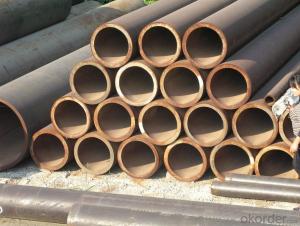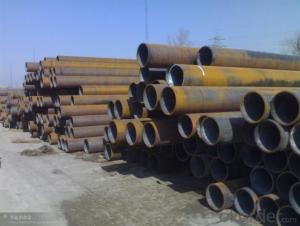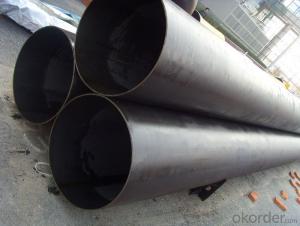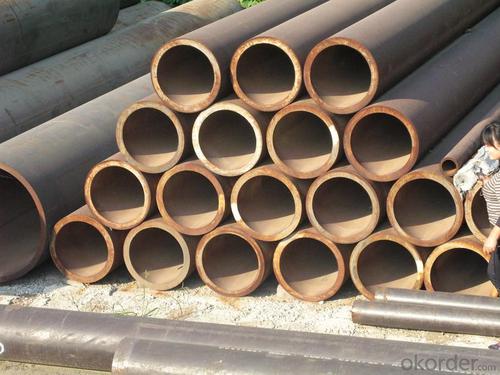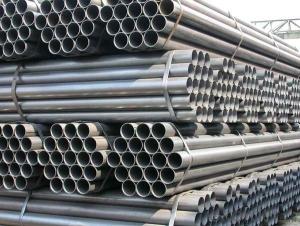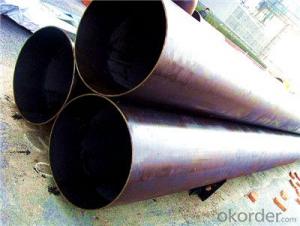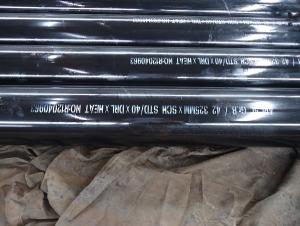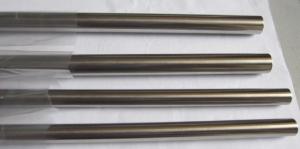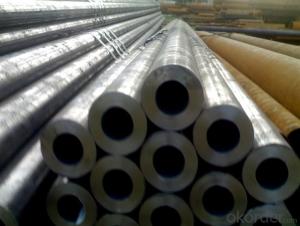Seamless Ferritic Alloy-Steel Pipe for High-Temperature Service structural steel price per ton
- Loading Port:
- Shanghai
- Payment Terms:
- TT OR LC
- Min Order Qty:
- 1000 kg
- Supply Capability:
- 10000 kg/month
OKorder Service Pledge
OKorder Financial Service
You Might Also Like
ASTM A335 seamless ferritic alloy-steel pipe for high temperature service
1)Standard:A335
2)Material:P1,P2,P5,P5-b,P5-c,P9,P11,P12,P22,P91,P92
3)Size: OD. 10-650mm,WT.1-80mm.
Application:Boiler, electricity, mechanical, gas cylinder, chemical, offshore and oil service.
Surface Finishing:Anti-corrosion and high-temperature resistant with black painting.
Packing:Bundles, seaworthy wooden cases.With or without end caps, varnish or as per clients requirements.
ASTM A335 is a ASTM standard specifies Seamless Ferritic Alloy Steel Pipe for High-Temperature Service. ASTM A335 pipe ordered to this specification shall be suitable for bending and similar forming operations, and for fusion welding. Selection will depend upon design, service conditions, mechanical properties, and high-temperature characteristics.
ASTM A335 Seamless Alloy-Steel Pipe
Standard: BS 1139, BS 3059-2, JIS G3454-2007
Grade: 10#-45#, 15NiCuMoNb5, 10Cr9Mo1VNb
Detailed introduction to ASTM A335 seamless alloy steel pipe:
ASTM A335 seamless alloy steel pipe
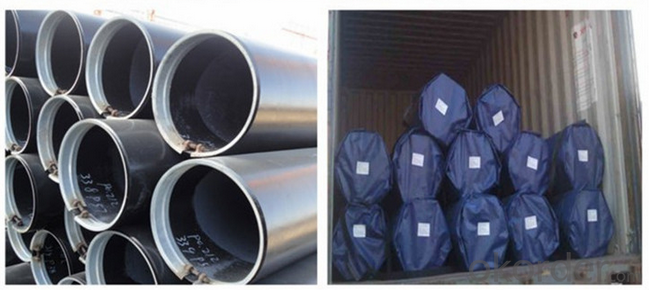
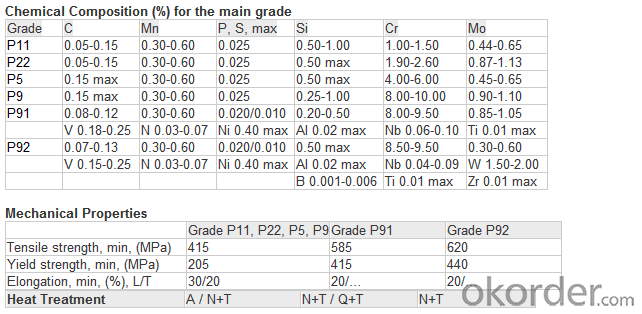
FAQ:
1) why you chose us ?
Professional Manufacturer and supplier of Steel pipe
More than 14 years’ professional producing experience
We can get the lowest ex-factory prices. The price are quite reasonable and it is lower than our commercial peers. also, we can guarantee the qualities of our products.
BV, ISO certificates and SGS test can be provided to assure the quality of our products.
2) Our minimum order quantity:
10 Metric Tons or one 20ft or 40ft Container.
3) How about the Delivery Time?
The steel pipe will be produced since we getting your deposit by T/T or Your original L/C. For normal size, some stocks in our factory now, we can supply once you need.
4)What kind of payment does your company support?
T/T, 100% L/C at sight, Cash, Western Union are all accepted.
5) Do you charge for the samples?
According to our company principle, we just charge for samples, you pay for the freight /courier charge.
6) Main market:
Mid East, South America, Africa, Southeast Asia, India etc
- Q: How are steel pipes used in the manufacturing sector?
- Steel pipes are commonly used in the manufacturing sector for various purposes, such as transporting fluids and gases, providing structural support, and facilitating the flow of materials in manufacturing processes. They are used in industries like construction, oil and gas, automotive, and aerospace for applications such as pipelines, machinery, conveyors, and infrastructure. Steel pipes offer durability, strength, and resistance to corrosion, making them an ideal choice for many manufacturing needs.
- Q: What is the average lifespan of a steel pipe?
- The average lifespan of a steel pipe can vary depending on various factors such as the quality of the steel, the environment it is exposed to, and the maintenance practices followed. However, on average, a well-maintained steel pipe can last anywhere between 20 to 100 years.
- Q: Can steel pipes be used for gas distribution?
- Yes, steel pipes can be used for gas distribution due to their high durability and resistance to corrosion.
- Q: Can steel pipes be used for solar power systems?
- Yes, steel pipes can be used for solar power systems. Steel pipes are commonly used for the construction of solar panel frames, mounting systems, and the support structures for solar thermal collectors. They provide durability, strength, and are resistant to weather conditions, making them suitable for various components of solar power systems.
- Q: How are steel pipes used in fire protection systems?
- Steel pipes are an integral part of fire protection systems, primarily used for the distribution of water or other fire suppressants in buildings. These pipes are known for their strength, durability, and resistance to high temperatures, making them ideal for withstanding the intense conditions of a fire. In fire protection systems, steel pipes are commonly used to create a network of pipes that deliver water to sprinkler heads or fire hydrants throughout a building. This network ensures that water is readily available to suppress or extinguish a fire in case of an emergency. One of the key advantages of steel pipes in fire protection systems is their ability to withstand the high pressure and flow rates required for effective fire suppression. Steel pipes can handle the forceful water flow needed to quickly and efficiently distribute water to the affected areas, helping to control and extinguish the fire as soon as possible. Additionally, steel pipes are resistant to corrosion, which is essential for maintaining the integrity of the fire protection system over time. Corrosion can weaken pipes, leading to leaks or even complete failure, which can be catastrophic in a fire situation. Steel pipes, however, have a longer lifespan and require less maintenance compared to other pipe materials, ensuring the system remains reliable and functional for years to come. Furthermore, steel pipes are often used in fire protection systems due to their fire resistance properties. Steel is inherently fire-resistant, meaning it can withstand high temperatures without deforming or losing its structural integrity. This is crucial in fire protection systems as it allows the pipes to remain intact and continue delivering water even in the midst of a fire, ensuring the safety of occupants and minimizing damage to the building. In summary, steel pipes play a vital role in fire protection systems by ensuring a reliable and efficient distribution of water or fire suppressants. Their strength, durability, resistance to high temperatures, and corrosion resistance make them an ideal choice for effectively combating fires and safeguarding lives and property.
- Q: What is the composition of steel pipes?
- Steel pipes are primarily composed of iron and carbon, with small amounts of other elements such as manganese, silicon, and traces of sulfur and phosphorus.
- Q: What is the difference between hot-dip galvanizing and electroplating of steel pipes?
- Hot-dip galvanizing and electroplating are two different methods used to protect steel pipes from corrosion. Hot-dip galvanizing involves immersing the steel pipes into a molten zinc bath. The zinc reacts with the steel surface, forming a series of zinc-iron alloy layers on the pipe's surface. This process creates a robust and uniform coating that provides excellent corrosion resistance. Hot-dip galvanizing is commonly used for outdoor applications and in environments where the pipes are exposed to harsh conditions, such as water or chemicals. On the other hand, electroplating involves the deposition of a thin layer of metal onto the surface of the steel pipes using an electric current. In the case of steel pipes, the most common metal used for electroplating is zinc. The steel pipes act as the cathode, and a zinc anode is placed in a solution containing zinc ions. The electric current causes the zinc ions to react with the steel surface, resulting in the formation of a thin zinc coating. Electroplating provides a more decorative finish and is often used for indoor applications or when aesthetics are a priority. In terms of the coating thickness, hot-dip galvanizing generally provides a thicker and more durable coating compared to electroplating. The hot-dip galvanized coating is typically several times thicker than the electroplated zinc coating. This thicker coating offers better protection against corrosion and provides a longer lifespan for the steel pipes. Another difference lies in the coating appearance. Hot-dip galvanizing produces a coating with a matte gray finish, while electroplating can result in a more lustrous and shiny appearance. Cost-wise, hot-dip galvanizing is generally more cost-effective for larger projects due to its efficiency in coating multiple pipes simultaneously. Electroplating, on the other hand, is typically more expensive and time-consuming, especially for larger quantities of steel pipes. Overall, the choice between hot-dip galvanizing and electroplating depends on the specific requirements of the project, including the intended application, environment, aesthetics, and budget constraints.
- Q: How does galvanization protect steel pipes from corrosion?
- Galvanization protects steel pipes from corrosion by creating a protective zinc layer on the surface of the steel. This zinc layer acts as a barrier, preventing moisture and oxygen from reaching the steel, thus inhibiting the formation of rust and corrosion.
- Q: There are multiple welded galvanized steel pipe outer diameter 108mm wall thickness 4mm length of 6 meters
- Galvanized steel pipe wall thickness weight outer diameter 108mm 4mm 6 meters in length is about 10.26*6*1.06=65 kg.Kg/m= (outside diameter mm-, wall thickness mm) * wall thickness mm*0.02466= (108-4) *4*0.02466=10.26 kg / MBecause of galvanizing, the weight is heavier than that of ordinary welded pipe 3%~6%.
- Q: What is the difference between seamless and welded steel pipes?
- The main difference between seamless and welded steel pipes lies in their manufacturing process. Seamless pipes are made by piercing a solid cylindrical steel billet to create a hollow tube without any welding or joints. On the other hand, welded pipes are formed by rolling a flat steel plate and then welding the edges together to create a cylindrical shape. This welding process introduces a seam along the length of the pipe. Consequently, seamless pipes are typically considered stronger, more reliable, and better suited for high-pressure applications, while welded pipes are more cost-effective and commonly used for less demanding applications.
Send your message to us
Seamless Ferritic Alloy-Steel Pipe for High-Temperature Service structural steel price per ton
- Loading Port:
- Shanghai
- Payment Terms:
- TT OR LC
- Min Order Qty:
- 1000 kg
- Supply Capability:
- 10000 kg/month
OKorder Service Pledge
OKorder Financial Service
Similar products
Hot products
Hot Searches
Related keywords
